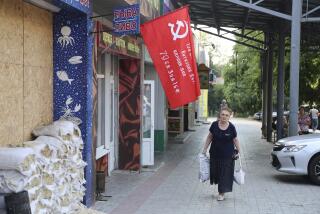Yeltsin Orders Last of Troops Out of Chechnya
- Share via
MOSCOW — In what may be a final retreat from separatist Chechnya, Russian President Boris N. Yeltsin on Saturday ordered the last 6,000 of his defeated troops to leave the war-shattered republic so it can elect its own leaders in peace.
Yeltsin’s decree cleared the way for an agreement between Russian and Chechen authorities, signed later in the day, to restore trade and free movement of people for the first time since hostilities erupted in December 1994.
Neither step taken Saturday had any formal bearing on Chechnya’s still-unresolved claim of independence--a secession bid that prompted Yeltsin’s army to invade the republic, seize its capital and wage the deadliest conflict on Russian soil since World War II.
But the move drew criticism from nationalists in Russia, who noted that the troops are the last symbol of Russian power in a land now under the de facto rule of Muslim separatist guerrilla leaders.
After a victorious rebel counteroffensive this summer, both sides agreed to postpone the dispute over Chechnya’s constitutional status for five years and allow the Chechens to choose new leaders to replace those imposed by Moscow. Elections for a president and parliament are scheduled for Jan. 27.
Until Saturday, Yeltsin had insisted on keeping Russian troops in Chechnya indefinitely, despite a provision in an Aug. 31 peace accord--brokered by former Security Council chief Alexander I. Lebed--for a prompt withdrawal.
*
Yeltsin’s spokesman, Sergei V. Yastrzhembsky, explained the turnabout as a unilateral “sign of goodwill” demonstrating “the president’s view that there can be no military solution” in Chechnya.
“The Chechen people have been given the opportunity to make their choice not at machine-gunpoint,” he added.
Yastrzhembsky took pains to insist that the withdrawal “will not mean that Chechnya ceases to be part of Russia.”
But the move drew criticism. Gennady N. Seleznyov, the Communist chairman of Russia’s lower house of parliament, charged that Yeltsin acted under pressure to head off a threatened new declaration of Chechen independence.
Lev Y. Rokhlin, a general who commanded Russian troops in Chechnya and is now a member of parliament, said the pullout would leave the southern republic’s two airports open to “drugs, terrorists and arms.”
The remaining Russian troops belong to an army brigade and an Interior Ministry brigade. They have been cooped up in two airfield bases just outside Grozny, the Chechen capital, since the separatists overran the city in August.
Although the withdrawal deadline is the day of the Chechen elections, a Russian official told the Interfax news agency that most remaining troops will leave by the end of this year. Their units will be stationed near the Chechen border, officials said.
Yeltsin’s troop withdrawal order satisfied the rebels’ most important demand short of outright independence. Zelimkhan A. Yandarbiyev, the top separatist leader, said it “will ensure movement toward a peaceful resolution” of the conflict.
Hours after the order was announced, separatist military commander Aslan Maskhadov arrived in the Moscow area to sign a political and economic agreement with Russian Prime Minister Viktor S. Chernomyrdin. The talks took place at Barvikha, the country retreat near Moscow where Yeltsin is recovering from heart surgery.
The two sides agreed that a comprehensive accord spelling out “special economic relations” will be negotiated between Moscow and the Chechen authorities elected in January.
In a nod to Chechnya’s autonomy, it said the accord will be based on Russian and Chechen law.
Saturday’s agreement also outlines steps to be taken before the elections to restore normal life in Chechnya and protect international oil pipelines running through the republic.
It calls for reopening the civilian airport and allowing free movement of rail and road transport into and out of Chechnya. By Dec. 1, the two sides are to agree on customs rules for goods entering and leaving the republic and on procedures for pumping, refining and exporting oil from there.
Diversion of oil from pipelines in Chechnya was an important source of income for the separatist republic before the war--and one reason Yeltsin invaded. Although no longer a major oil producer, Chechnya sits on a pipeline route linking the oil-rich Caspian Sea and ports on the Black Sea with access to the West.
The Chechen side agreed Saturday to safeguard all energy fields, refineries and pipelines on its territory.
The accord called for “urgent” measures to rebuild destroyed towns, villages and infrastructure; pay long-delayed salaries and pensions; and compensate war victims in Chechnya, where 30,000 to 80,000 people died in the fighting. It did not say who would foot the bill.
“It is clear the Russian side is not going to pay a kopeck until the election results are clear,” said Dzhabrail Gakayev, director of the Chechen cultural center in Moscow.
*
That raises the question of the Kremlin’s long-term intentions in Chechnya. If a hard-line separatist wins the Chechen election, Moscow might write off Chechnya, denying it reconstruction money. If a moderate wins, Moscow could pour in aid, trying to win over separatist hearts and minds within five years’ time.
Yandarbiyev, a well-known poet and longtime nationalist who succeeded slain independence leader Dzhokar M. Dudayev in April, announced his candidacy for president Saturday.
It is not clear whether Yandarbiyev will be the only separatist candidate for the post or whether he will be challenged by Maskhadov, who is more acceptable to Moscow, or by Shamil Basayev, the legendary separatist field commander who is wanted in Moscow as a criminal.
Chechnya’s pro-Russian minority might rally behind its own candidate, such as former Russian Parliament Speaker Ruslan I. Khasbulatov, who is thinking about running.
More to Read
Sign up for Essential California
The most important California stories and recommendations in your inbox every morning.
You may occasionally receive promotional content from the Los Angeles Times.













